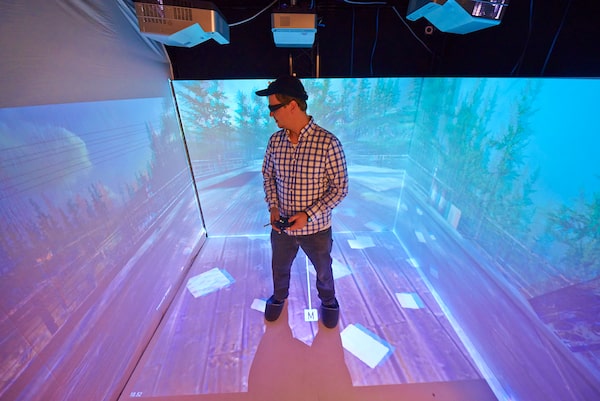
The EON Reality iCube at the Faculty of Business and Information Technology at the University of Ontario Institute of Technology is a multisided immersive environment that can be used for the development of visualization systems and immersive virtual reality content creation.Ian Crysler
Artificial intelligence (AI) is taking on growing importance in higher education, and similar to what is happening with AI in other fields – its growth could be explosive in the near future.
"It's deep and broad at the same time," says Langis Roy, dean of graduate studies at University of Ontario Institute of Technology (UOIT) in Oshawa, Ont. AI is already permeating every aspect of teaching, learning and administration.
"A few years ago we were talking about robotics and automation, then it was informatics – integrating computers into every aspect of life. After that, there was hype around big data – what to do with the reams of information that computers gather," Mr.Roy explains.
“AI captures all of this – everything I just said.”
AI is being deployed in virtually every area of university life, from admissions to the time when students choose courses, to the way teachers organize and teach, to the guidance from teaching assistants, to marks and grading.
It has already been a couple of years since Georgia Tech professor Ashok Goel introduced “Jill Watson,” a teaching assistant who was actually a robot based on IBM’s Watson platform (the same platform that beat a human champ on Jeopardy!).
Jill answered students' online questions in Mr. Goel's graduate-level AI class, but the 300 students in the course didn't realize they were talking to a chatbot until the end of the term.
In June, IBM unveiled a robot it calls Project Debater, which uses speech recognition and draws information from hundreds of millions of articles to hold its own in an argument with humans.
For now, human interaction still rules, says Henry Kim, associate professor and co-director of the Blockchain Lab at the Schulich School of Business at York University in Toronto.
"It's still important to get a bunch of people together, to have discussions and for professors to talk with their master's and PhD students. Education is meant to be inherently social," he says.
At the same time, Mr. Kim's Schulich School has been offering a specialty master program in data analytics and, along with other schools, is offering programs in managing artificial intelligence, to help business leaders make sense of all the data AI can offer in the working world.
Experts in both academics and the tech sector agree that AI is quickly becoming more sophisticated in what it can offer universities and students.
"We're getting more data on student outcomes. We can chart the data, identify students who might be at risk of not completing and then come up with programs to help," says Michael Bliemel, dean of UOIT's Faculty of Business and Information Technology.
While in the past, this data was collected and analyzed manually, AI speeds up and enhances the ability to know what is on students' minds, Mr. Bliemel says.
"I have a student who's looking at trying to tell whether students' minds are wandering," he says. "If the research is successful, we'll be able to tell [through AI] whether a student is bored or not."
Eran Ben-Ari is chief product officer at Top Hat, a Toronto-headquartered cloud-based learning platform. In his view, artificial intelligence is doing exactly what it is supposed to – enhance and strengthen the work that students, teachers and administrators already do.
"First, AI can provide better service for incoming students, who often have similar questions: 'How do I log into my courses, how do I pay my tuition,' and so on. AI can predict and modify to provide personal, nuanced answers, almost on the fly," Mr. Ben-Ari says.
Second, AI can help students' learning, he says, by connecting data points to identify within a few weeks which students are having trouble with their courses and could use extra help.
Contrary to the misconception that AI means dealing with a cold, unfeeling robot, a student's AI experience may be tailored closely to their needs, for example by recommending additional reading or sources for explaining course material. "AI adapts quickly to your specific knowledge," Mr. Ben-Ari says.
Jeremy Auger, chief strategy officer at education technology company Desire2Learn (D2L), says AI can also be deployed to improve the courses universities offer.
“A lot of this information can be gathered by asking students in the class, but AI can organize and analyze the data,” says Mr. Auger, whose Kitchener, Ont.-based company provides cloud-based services for educators.